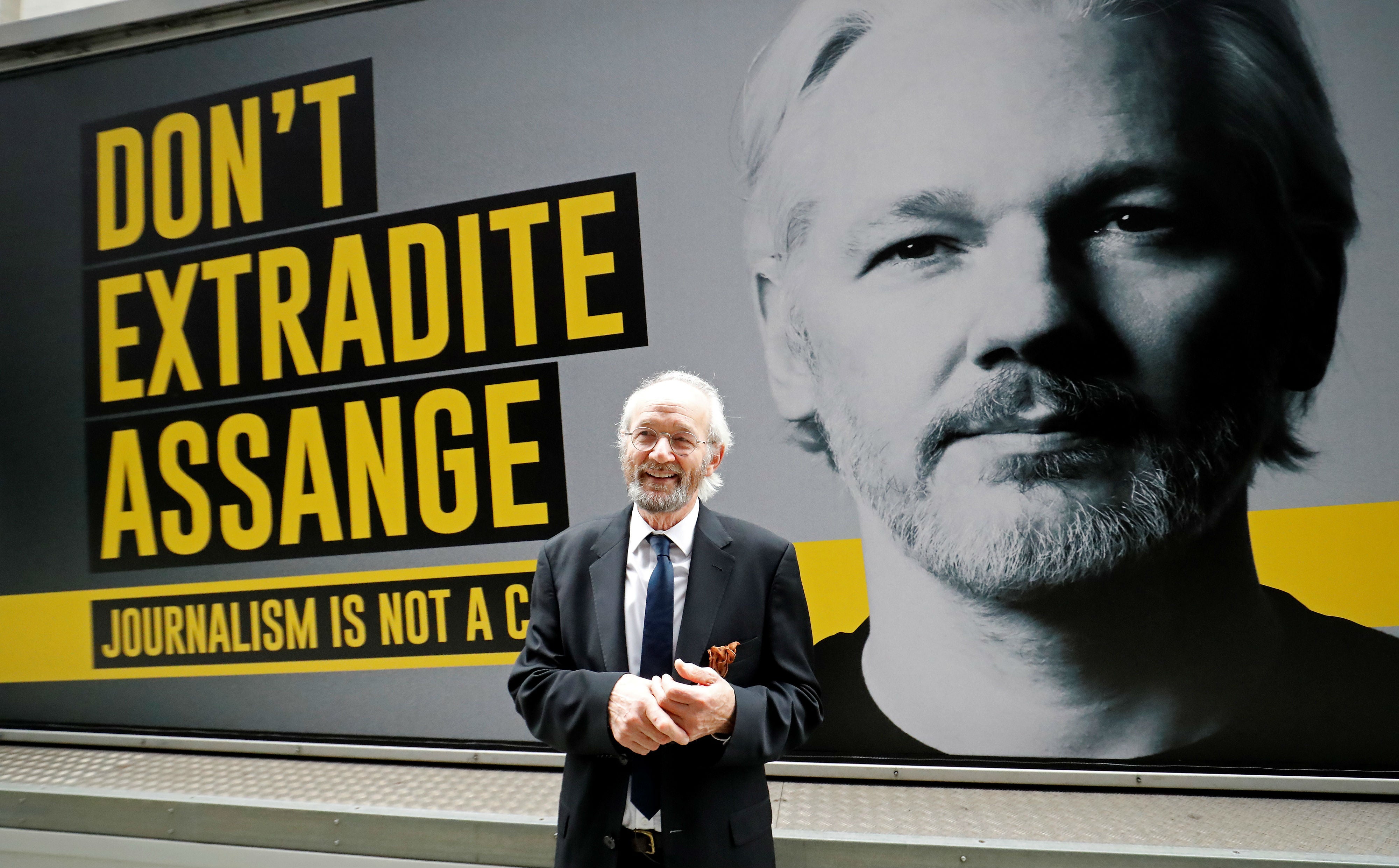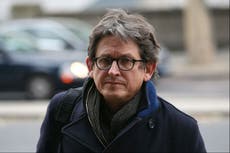Julian Assange’s father says ‘greatest fear is they will take him to the US and break him for revenge’
John Shipton tells Andrew Buncombe his son faces 'wretched injustice’


Your support helps us to tell the story
From reproductive rights to climate change to Big Tech, The Independent is on the ground when the story is developing. Whether it's investigating the financials of Elon Musk's pro-Trump PAC or producing our latest documentary, 'The A Word', which shines a light on the American women fighting for reproductive rights, we know how important it is to parse out the facts from the messaging.
At such a critical moment in US history, we need reporters on the ground. Your donation allows us to keep sending journalists to speak to both sides of the story.
The Independent is trusted by Americans across the entire political spectrum. And unlike many other quality news outlets, we choose not to lock Americans out of our reporting and analysis with paywalls. We believe quality journalism should be available to everyone, paid for by those who can afford it.
Your support makes all the difference.John Shipton does not mince his words.
The father of Julian Assange says he believes the US wants to extradite his son and “break him” in revenge for having helped expose what he says were war crimes.
If he is sent to the US and convicted of computer hacking and espionage, he faces a sentence of up to 175 years imprisonment in a high security jail in Colorado, likely held in a single cell for 23 hours a day under so-called Special Administrative Measures.
“Just to give you some idea what that means – you're in a small cell, eight feet by ten feet. A concrete wall, a steel door that has a hole in the door. You’re not allowed to speak to each other. Every half an hour, the guard comes along and looks in the peephole,” he says.
“The prisoners, in order to communicate with each other, anybody, yell out. bellow, because these are steel doors. So you get this cacophony of screaming in the hallway as people try and communicate with each other. Some of them have been there 10 years, and their minds are cracked. So consequently, they just scream, just to hear their own echoes off the wall.”
He adds: “This hellish cacophony is only broken by the guards coming along every half an hour to look in. The reason they do inspect is to stop you from committing suicide. So you’re made to continue to suffer the insufferable. It is vile beyond words. Anyway, that’s what they would do to Julian.”
Shipton, 76, speaks to The Independent from Australia, days before a court in London is to decide whether his 49-year-old son, the founder of WikiLeaks, should be extradited to the US to face charges of hacking a Pentagon computer and 17 indictments under the 1917 Espionage Act. The act, passed at a time when the US was at war, does not allow a defendant to argue they were acting in the public interest.
His description of what he believes would await his son were he sent to the “SuperMax” prison at Florence, Colorado, where the inmates include “Unabomber“ Theodore Kaczynski, the Boston Marathon bomber Dzhokhar Tsarnaev, and 1993 World Trade Centre bomber Ramzi Yousef, echoes testimony from former staff and lawyers, and was presented as evidence during Assange’s hearing.
Shipton, who attended many of the hearings in London, is clear in his opinion of why the US wants to gets his son.
“Julian has the reputation as a speaker of the truth. And WikiLeaks revealed war crimes, and crimes against humanity,” he says. “The persecution of Julian is to destroy the capacity of Julian to speak the truth about what's happened over the last 20 years or so, and the destruction of the Middle East.”
Shipton points to the work of Australian academic Dr Gideon Polya and others, who have estimated the US-led invasion of Iraq and Afghanistan led to millions of deaths. He also says millions of people were turned into migrants or refugees as a result of the conflicts.
“The persecution of Julian is founded upon disguising their intentions,” he says.
Shipton and Assange’s mother, Christine Hawkins, parted before his son was born. Assange took his last name from his stepfather, Brett Assange. Shipton was not present when Assange was growing up, but says he was in regular contact with him from the age of around 24.
Had Assange shown an interest in challenging the powerful by that point?
“We only ever spoke about how to analyse, or how to get at what is actually happening in the world, you know, what is actuality,” he says. “And then, after the Desert Storm destruction of Iraq, then things intensified.”
He adds: “He doesn’t hate the US, by the way. The nature of his work is very similar to the nature of the US. They have the First Amendment, they have a constitution, they have the Bill of Rights.
“And they have the belief that the ferment generated by free speech will produce a wealth of ideas. That's the great side of the US, of course, the other side of the coin is its foreign policy.”
Shipton says neither Assange nor WikiLeaks hacked anything. Rather, the site acted as a publisher for materials provided by whistleblowers. It also allowed anyone to analyse and comment on the material, he says.
“It’s like shareware. You get millions of contributors to analysing the content of your leaks,” says Shipton. “The depth of analysis you can achieve is greater or equal to the State Department, because there’s many, many people with different perspectives and specialised knowledge. It’s the most extraordinary thing. Now, of course, forums are common.”
WikiLeaks’ best known source was Chelsea Manning, a former US army intelligence analyst based in Iraq who in early 2010 provided hundreds of thousands of secret documents to the site. She did so after becoming horrified at what the US and its allies were doing as part its so-called “war on terror”.
Among the material was a piece of footage showing two US AH-64 Apache helicopters attacking buildings in Baghdad in 2007, and then closing in a group of people on the ground. Among the people were children and journalists.
Wikileaks published the material with the headline “Collateral Murder”, in April 2010, with a press conference at the National Press Club in Washington DC.
Manning was arrested the following month, and eventually charged with 22 offences. A court martial sentenced her to 35 years in a a military prison at Fort Leavenworth. She would spend seven years in detention, much of it in solitary confinement, before the sentence was commuted by Barack Obama shortly before he left office.
Shipton says he visited Assange a number of times at Christmas during the seven years he spent at the Ecuadorian embassy in London, where he went in 2012 to seek, and obtain, asylum.
He did so after a court ordered him to be extradited to Sweden for questioning over two accusations of sexual assault. Assange denied the allegations. His lawyers said he was prepared to cooperate with Swedish investigators, but feared if he went to Sweden he could be sent on to the US.
In the spring of 2019, following pressure from the US and a change of government in Quito, Ecuador withdrew its protection of Assange and he was arrested by British police over the 2012 breach of his bail term. He was sentenced to 50 weeks in jail. The US then revealed a total of 17 new charges against him, and requested his extradition.
In November 2019, Sweden announced it had dropped its sexual offences investigations.
“Over the years, the number of people at Christmas dinner constantly declined, with the intensity of persecution of the Ecuadorian government, and then persecution by the Ecuadorian government,” Shipton says.
“So the year before last was just myself, Julian and his partner. And last year, it was just Julian and I.”
Shipton says he speaks regularly with his son by phone, at least when he is in the UK.
How are his spirits?
“He is resilient. But he’s 50, 49, years old. He’s been arbitrarily detained for 10 years, you never know where it’s going to end. Now, it looks like it might end in a Supermax Colorado prison on Special Administrative Measures, which means 23 hours a day by yourself in a cell, with no communication allowed.”
He adds: “It’s just wretched injustice. I call it a plague of malice.”
Subscribe to Independent Premium to bookmark this article
Want to bookmark your favourite articles and stories to read or reference later? Start your Independent Premium subscription today.



Join our commenting forum
Join thought-provoking conversations, follow other Independent readers and see their replies
Comments